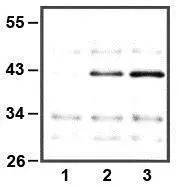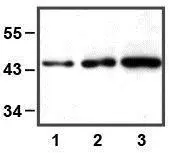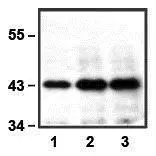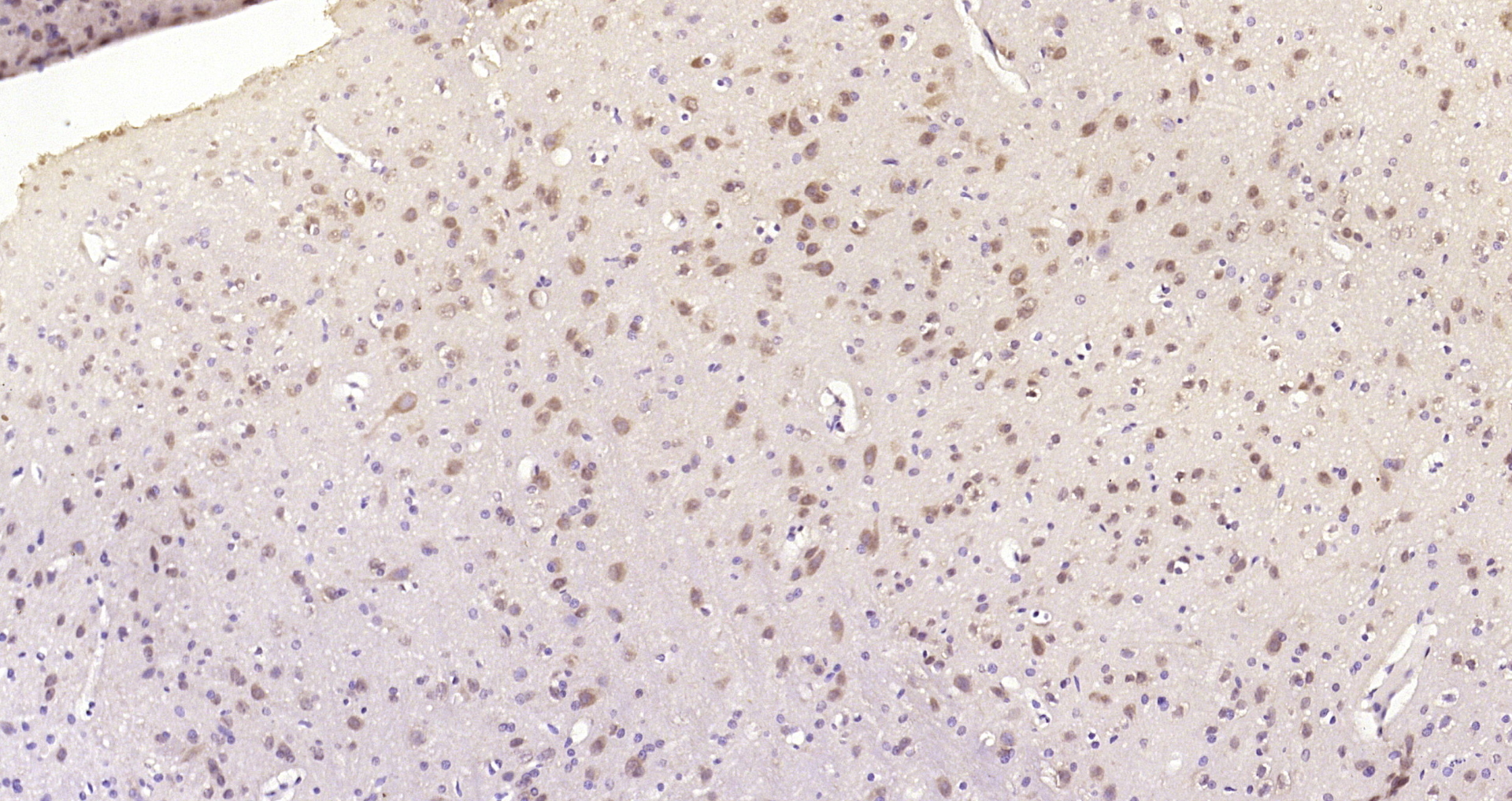
IP of anti-ERK1 (1μL) using HeLa cell lysate; 10μg (1), 25μg (2), and 50μg (3) of cell lysate used
ERK1 antibody [E32]
GTX82558
ApplicationsImmunoPrecipitation, Western Blot
Product group Antibodies
ReactivityHuman, Mouse
TargetMAPK3
Overview
- SupplierGeneTex
- Product NameERK1 antibody [E32]
- Delivery Days Customer9
- Application Supplier NoteRecommended Starting Dilutions:WB (with ECL): Use at a dilution of 1:1000-10000 For best results with other assays (e.g.: Dot, ELISA, IP, etc), please determine optimal working dilution by titration test
- ApplicationsImmunoPrecipitation, Western Blot
- CertificationResearch Use Only
- ClonalityMonoclonal
- Clone IDE32
- Concentration1 mg/ml
- ConjugateUnconjugated
- Gene ID5595
- Target nameMAPK3
- Target descriptionmitogen-activated protein kinase 3
- Target synonymsERK-1, ERK1, ERT2, HS44KDAP, HUMKER1A, P44ERK1, P44MAPK, PRKM3, p44-ERK1, p44-MAPK, mitogen-activated protein kinase 3, MAPK 1, extracellular signal-regulated kinase 1, extracellular signal-related kinase 1, insulin-stimulated MAP2 kinase, microtubule-associated protein 2 kinase
- HostMouse
- IsotypeIgG1
- Protein IDP27361
- Protein NameMitogen-activated protein kinase 3
- Scientific DescriptionThe protein encoded by this gene is a member of the MAP kinase family. MAP kinases, also known as extracellular signal-regulated kinases (ERKs), act in a signaling cascade that regulates various cellular processes such as proliferation, differentiation, and cell cycle progression in response to a variety of extracellular signals. This kinase is activated by upstream kinases, resulting in its translocation to the nucleus where it phosphorylates nuclear targets. Alternatively spliced transcript variants encoding different protein isoforms have been described. [provided by RefSeq, Jul 2008]
- ReactivityHuman, Mouse
- Storage Instruction-20°C or -80°C,2°C to 8°C
- UNSPSC12352203


![Various whole cell extracts (30 μg) were separated by 10% SDS-PAGE, and the membrane was blotted with ERK1 antibody [GT1156] (GTX01099) diluted at 1:1000. The HRP-conjugated anti-rabbit IgG antibody (GTX213110-01) was used to detect the primary antibody.](https://www.genetex.com/upload/website/prouct_img/normal/GTX01099/GTX01099_4000000040_20200410_WB_w_23053121_355.webp)
![Various whole cell extracts (30 μg) were separated by 10% SDS-PAGE, and the membranes were blotted with ERK1 antibody [N1], N-term (GTX100699) diluted at 1:1000 and competitor's antibody (sc-94) diluted at 1:2000. The HRP-conjugated anti-rabbit IgG antibody (GTX213110-01) was used to detect the primary antibody. *The competitor is not affiliated with GeneTex and does not endorse this product.](https://www.genetex.com/upload/website/prouct_img/normal/GTX100699/GTX100699_43068_20171215_WB_competitor_watermark_w_23060100_914.webp)
![WB analysis of human ERK1 (AA: 9-143) recombinant protein using GTX60492 ERK1 antibody [1E5].](https://www.genetex.com/upload/website/prouct_img/normal/GTX60492/GTX60492_20170912_WB_1_w_23061123_123.webp)
![Untreated (–) and treated (+) NIH-3T3 whole cell extracts (30 μg) were separated by 10% SDS-PAGE, and the membranes were blotted with ERK1 (phospho Thr202/Tyr204) + ERK2 (phospho Thr185/Tyr187) antibody [HL173] (GTX635617) diluted at 1:500 and competitor's antibody (# Highly Cited Antibody) diluted at 1:500. The HRP-conjugated anti-rabbit IgG antibody (GTX213110-01) was used to detect the primary antibody. *The competitor is not affiliated with GeneTex and does not endorse this product.](https://www.genetex.com/upload/website/prouct_img/normal/GTX635617/GTX635617_44711_20230217_WB_M_treatment_PDGF_competitor_watermark_23022022_844.webp)


